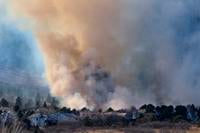Attorney general candidates talk water at Colorado Water Congress | Subscriber Content
The candidates for attorney general see water and the problems Colorado faces with its signature river in different lights but agree that renegotiating the Colorado River Compact, which dictates Colorado and its Upper Basin neighbors send more water downstream than is available, is not part of the solution .
John Kellner, the district attorney for the 18th Judicial District, is the Republican nominee for attorney general. He introduced himself to the Colorado Water Congress Wednesday, telling the audience he’s a Republican who believes in conservation, and defending and supporting the state’s clean water, air and land.
As attorney general, Kellner said, he would resist efforts to rewrite the 1922 Colorado Compact, which dictates that the seven states of the Colorado River basin equally share 15 million acre-feet of water annually. Because of climate change and 22 years of drought, the river provides no more than 12 million acre-feet and that’s led to critical low levels at Lake Mead, the reservoir for the Lower Basin states, and Lake Powell, which serves the same purpose for the Upper Basin states.
Kellner added he would protect Colorado’s right to grow at its own pace and without pressure from outside. Water is not a partisan issue, he said, and both parties have opposed efforts from the federal government to expand its authority over Colorado water; he would do the same as attorney general, he pledged.
Recent events have pointed out how important it is to protect the state’s water and property rights, Kellner said, noting the Bureau of Reclamation’s call for a seven-state plan to reduce Colorado River water use by 2 million to 4 million acre-feet within the next year, authority Kellner said the bureau does not have, at least with regard to the Upper Basin states.
Colorado already uses less water than it is entitled to, he added, and indicated he found it curious that Arizona and Nevada will shoulder the newest cuts that leave California unscathed.
Kellner, who said his focus as attorney general would be on crime prevention and public safety, said he would rely on experts to guide him on water issues, whether from the lawyers from the Attorney General’s Office to outside experts, such as those connected to the WaterCongress.
Kellner spoke with Colorado Politics after his remarks and on the Colorado compact. “We need to collaborate,” he said. While the West is in a drought, “we don’t expect to always be in a drought, so renegotiating the Colorado River compact in a way that could potentially harm our future growth is not a good idea. We need to open up lines of communication” and work with the Lower Basin states to ensure “we’re meeting our obligations and that we’re also maintaining our rights to what we’re allocated.”
Kellner’s judicial district includes Douglas County, and Colorado Politics asked about his views on the Douglas County project that would seek water from the San Luis Valley. “Last I heard, that’s not moving forward” with the Douglas County commissioners voting to not fund it, he said, part of a recommendation from the county’s legal counsel that advised there would be too many regulatory and legal hurdles for it to be a long time – term viable project.

Kellner said he’s spent time in the San Luis Valley talking to water leaders. “This water project, if it were to move forward, would significantly harm the economy, their way of life, and those are issues that you can’t just wave a magic wand and have them go away.”
He acknowledged that RWR principal and former Gov. Bill Owens is a friend and supporter; Kellner has taken campaign contributions from two RWR principals and the wife of a third. “I appreciate what [Owens] is trying to do to find solutions that work for both parties; some folks have property rights and want to sell them, and others have water rights that would continue the growth of their community,” said Kellner.
But “with a limited natural resource, it’s incumbent on us to find smart solutions that don’t harm other users,” he said. Those solutions could include smart water storage projects or expanding reservoirs. “But you can’t harm other folks and their water rights. It’s why Colorado’s system is as successful as it has been,” he added.
Attorney General Phil Weiser, the Democrat seeking a second term, told the Water Congress audience that he’s added two new lawyers to take on the water issues, including an assistant deputy attorney general for water.
The department has long had a division devoted to natural resources, started by David Robbins years ago. That’s an advantage over other states like Texas and New Mexico, whose attorneys general have had to hire outside legal counsel — for a lot of money — for recent negotiations on the Rio Grande.
Weiser noted the crisis on the Colorado River has made front-page news around the country. Critics have claimed Colorado is not doing enough, which Weiser disputed. “We’re far ahead of other Western states, especially those in the Lower Basin,” Weiser said, referring to innovation and conservation efforts. Colorado is one of the few states that administers its water rights based on what’s available, he claimed.
“We will double down on how we determine how much water is available. … Let’s recognize that the Upper Basin states have already contributed water to prop up the levels of the downstream reservoirs,” he added.
The Upper Basin states have also worked with the Bureau of Reclamation, the tribal nations and nongovernmental organizations on a 2022 drought response plan that will send 500,000 acre-feet of water from Flaming Gorge Reservoir, in Utah, to Powell, Weiser said, adding the plan will not need any more water from Blue Mesa, which water sent to Powell last year and is now at 60% of capacity.
But the solutions proposed so far have been temporary and are not sustainable, he said. “We need the Lower Basin states to step up” and take critical, and permanent action to conserve. “We stand ready to help the states in the lower basin as they develop new and innovative conservation efforts,” he added.
While the Colorado River crisis is growing, one issue that Weiser isn’t interested in is a new look at the Colorado River Compact, which has for a century dictated more water been sent to the seven basin states than is available, but which has become obvious as a result of the drought and changes from the warming climate.

Weiser told Colorado Politics that “once you open up the compact for renegotiation, everything is fair game. … That story doesn’t end well.”
The game changer, he added, is that the reservoirs can no longer ship the same amount of river as before. That’s a constraint that will have to change behavior, he said. “We need the Lower Basin states to get real. That’s the moment we’re now in. We want to help them, because the old models no longer work.”






Comments are closed.